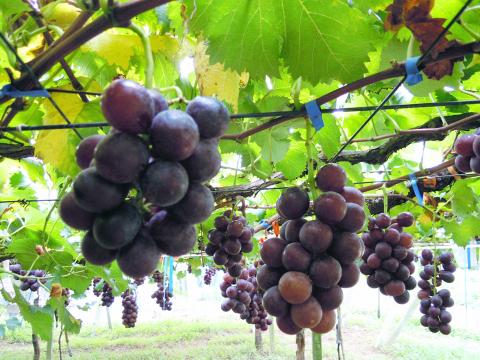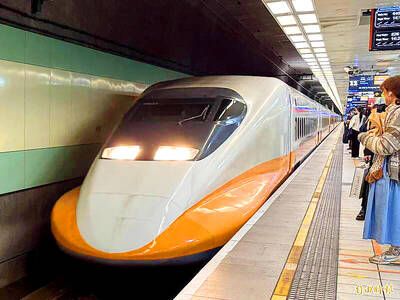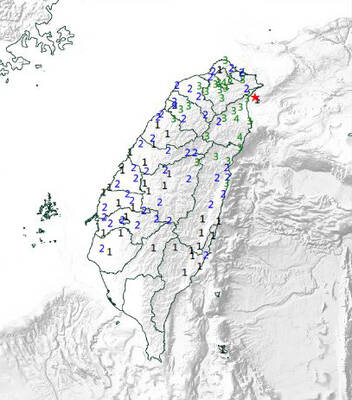The Council of Agriculture’s Miaoli County agricultural research and extension station, in cooperation with National Chung Hsing University, has produced the first Taiwan-planted seedless Kyoho grapes.
The Kyoho grape, known for its large size, is a cross between the Ishihara and Centennial grape varieties and was first produced in Japan in 1937.
According to the station’s researcher Liu Yun-tsung (劉雲聰), 60 percent of Kyoho grapes in Japan are seedless, but the technique and the amount of pesticides used on the grapes planted in Taiwan were unable to render them seedless.

Photo courtesy of the Miaoli District Agricultural Research and Extension Station.
After three years of joint research with the university, the team was finally able to produce seedless Kyoho grapes grown in Taiwan, Liu said, adding that this year the station planted an experimental crop on a 293.4 ping (969.9m2) plot of land which yielded a harvest of 200kg.
“This is the first time that Taiwan has been able to produce a steady amount of seedless Kyoho grapes,” Liu said.
The key was to use gibberellic acid, a hormone found in plants, and streptomycin, an antibiotic drug, when the grapes are flowering, Liu said, adding that the process causes 95 percent of the grapes to become seedless.
A single grape from a crop harvested in summer could weigh between 9 and 14g, and the sweetness could reach as high as 18 degrees brix, the unit used to measure the sugar of an aqueous solution, Liu said.
“We currently estimate that we can double the production and we have already published the technique in agricultural journals and magazines for farmers to use free of charge,” Liu said.
The seedless Taiwan-grown Kyoho grapes will be sold for between NT$200 and NT$500 per kilo, Liu said, adding that two bunches of Japanese Kyoho seedless grapes usually cost over NT$1,000.

A 72-year-old man in Kaohsiung was sentenced to 40 days in jail after he was found having sex with a 67-year-old woman under a slide in a public park on Sunday afternoon. At 3pm on Sunday, a mother surnamed Liang (梁) was with her child at a neighborhood park when they found the man, surnamed Tsai (蔡), and woman, surnamed Huang (黃), underneath the slide. Liang took her child away from the scene, took photographs of the two and called the police, who arrived and arrested the couple. During questioning, Tsai told police that he had met Huang that day and offered to

LOOKING NORTH: The base would enhance the military’s awareness of activities in the Bashi Channel, which China Coast Guard ships have been frequenting, an expert said The Philippine Navy on Thursday last week inaugurated a forward operating base in the country’s northern most province of Batanes, which at 185km from Taiwan would be strategically important in a military conflict in the Taiwan Strait. The Philippine Daily Inquirer quoted Northern Luzon Command Commander Lieutenant General Fernyl Buca as saying that the base in Mahatao would bolster the country’s northern defenses and response capabilities. The base is also a response to the “irregular presence this month of armed” of China Coast Guard vessels frequenting the Bashi Channel in the Luzon Strait just south of Taiwan, the paper reported, citing a

BETTER SERVICE QUALITY: From Nov. 10, tickets with reserved seats would only be valid for the date, train and route specified on the ticket, THSRC said Starting on Nov. 10, high-speed rail passengers with reserved seats would be required to exchange their tickets to board an earlier train. Passengers with reserved seats on a specific train are currently allowed to board earlier trains on the same day and sit in non-reserved cars, but as this is happening increasingly often, and affecting quality of travel and ticket sales, Taiwan High-Speed Rail Corp (THSRC) announced that it would be canceling the policy on Nov. 10. It is one of several new measures launched by THSRC chairman Shih Che (史哲) to improve the quality of service, it said. The company also said

A magnitude 6 earthquake last night at 9:11pm struck off northeastern Yilan County, the Central Weather Administration (CWA) said. The earthquake’s epicenter was located in waters between Toucheng Township (頭城) and Turtle Island (Gueishan Island, 龜山島), about 22.1km northeast of Yilan County Hall at a depth of 112km, CWA data showed. There were no immediate reports of damage. The earthquake’s intensity, which gauges the actual effects of a temblor, was highest in Yilan’s Dongshan (冬山) and Nanao (南澳) townships and Taipei’s Xinyi District (信義), where it measured 4 on Taiwan’s seven-tier intensity scale. It measured 3 in other areas of Yilan and Taipei, as